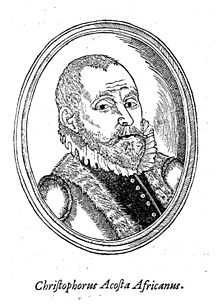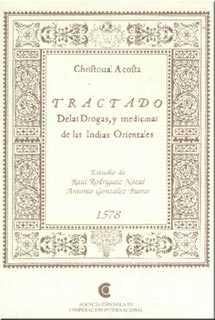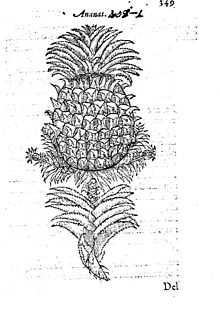Cristóvão da Costa (botanist)
| Cristóvão da Costa | |
|---|---|
 | |
| Born |
1515 Tangier or Portuguese Cape Verde |
| Died |
1594 Huelva, Spain |
| Nationality | Portuguese |
| Occupation | Doctor and natural historian |


Cristóvão da Costa (1515 – 1594) was a Portuguese doctor and natural historian. He is considered a pioneer in the study of plants from the Orient, especially their use in pharmacology. Together with the apothecary Tomé Pires and the physician Garcia de Orta he is one of the major names of Indo-Portuguese medicine.
Life
He is believed to have been born somewhere in Africa (possibly Tangier) or in Portuguese Cape Verde, since in his work he claims to be African (Christoval Accosta Africano), but the exact place and date of his birth remain unknown.
Cristóvão da Costa first travelled to the East Indies in 1550 as a soldier. He took part in some campaigns against the native populace, and at one point was taken prisoner and held captive in Bengal. After returning to Portugal, he joined his former captain, Luís de Ataíde, who had been appointed viceroy of Portuguese India. He returned to Goa in 1568, the year Garcia de Orta died. He served as personal physician to the viceroy, and in 1569 was appointed physician to the royal hospital in Cochin, where he had the opportunity of treating the king of Cochin. By 1571, he was noted as collecting botanical specimens from various parts of India. He returned to Portugal in 1572 after Ataíde's term ended. From 1576 to 1587 he served as surgeon and then physician in Burgos (Spain).
At Burgos in 1578 he published (in Spanish) his work Tractado de las drogas y medicinas de las Indias orientales ("Treatise of the drugs and medicines of the East Indies"). In this he says he was brought to India by his desire to find "in several regions and provinces learned and curious men from whom I could daily learn something new; and to see the diversity of plants God has created for human health". Parts of this work were translated into Latin by Charles de l'Ecluse (Carolus Clusius), eventually to be included in his illustrated compendium Exoticorum libri decem (1605).
Costa's book is not wholly original, drawing a great deal (with minimal acknowledgement) from the previously-published Colóquios dos Simples e Drogas da India of Garcia de Orta. It soon became better known than Garcia's work.
Another work of note was Tractado de la yerbas, plantas, frutas y animales, but this treatise is now believed lost.
When his wife died, Acosta retired and went to live in a hermitage. He died in 1594 in Huelva, Spain.
The crater Acosta on the Moon is named in his honor.
See also
Further reading
- Gaitonde, P.D. (1983).Portuguese Pioneers in India: Spotlight on Medicine. Popular Books, Bombay, India. ISBN 0-86132-025-5.
- Guerra, Francisco (1970). "Acosta, Cristóbal". Dictionary of Scientific Biography 1. New York: Charles Scribner's Sons. pp. 47–48. ISBN 0-684-10114-9.
External links
- The Galileo Project site was used in building this page.
- Online Galleries, History of Science Collections, University of Oklahoma Libraries High resolution images of works by and/or portraits of Cristóvão da Costa in .jpg and .tiff format.
|